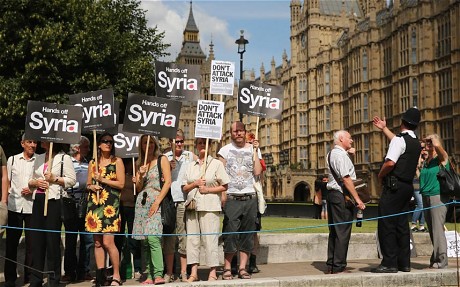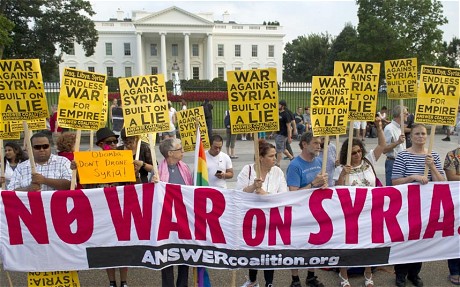While Obama was calling for limited military action in Syria, most of US allies, namely Germany and UK stand on a point that Syrian crisis can be solved using ‘political method’. Although Britain’s Prime Minister David Cameron supported his cross Atlantic peer on taking military action, even published it on twitter, seems that the House of Commons felt and voted differently.
This decision has not came by surprise – UK’s publicity was tired of participating in war against Afghanistan and Iraq. Even then, 2001 and 2003, the public strongly disagreed to be a part of it, as they are now against military intervention in Syria. This time MPs heard the voice of people, as against the voice of Downing Street. This was a clear example of participative leadership, taken by British Government under David Cameron.
“It is clear to me that the British Parliament, reflecting the views of the British people, does not want to see British military action. I get that and the Government will act accordingly.”, said Cameron after Parliament rejected backing the use of force “if necessary” by 285 votes to 272, a majority of 13 votes, reports British Telegraph in the text with significant headline “No to war, blow to Cameron”. That day, another interesting thing happened – for the first time British Government lost support for military intervention, which gave an excellent argument for Cameron’s opponents to ask for his resignation.
For the French president Francois Hollande this was as an opportunity to criticize Cameron and mark him as a weak leader commenting that “He committed a schoolboy error. He overestimated his strength and didn’t find a way of convincing his Parliamentary majority”. Was it really weak from Cameron to ask for support of Parliament for such major decision in democratic society? One of the features of the weak leaders is refusing to take a responsibility. In this case, Cameron showed that he can take responsibility for his “defeat” in the Parliament. Isn’t that what a mature leader elected by the people should do? I stand on a point that it is exactly what a participative leader in representative democracy should do.
Technically speaking, Cameron did not have to ask for support of the Parliament. According to the royal prerogative prime minister can declare the war on his own, without asking for consent from the Parliament. However, in practice it is common to receive a support for military actions. Cameron promised not to use royal prerogative and kept it, as he afterwards explained: “I strongly believe in the need for a tough response to the use of chemical weapons, but I also believe in respecting the will of the House of Commons.”
Some political analysts feel that so called “defeat” of Cameron came as a warning to Obama not to be “defeated” in the same way on his own territory, which led him to decision to delay voting in Congress. And after all, to change the course of its politics and give another chance to diplomacy.
Some also felt that Obama showed a feature of a weak leader, showing uncertainty for first decisions to go for limited military action and not to ask for permission of Congress. As we see today, things are quite the opposite. Obama changed his mind, due to “against the war” atmosphere.
Two countries, traditional allies, and two leaders faced the same challenge – to ignore or to listen the voice of the public. For now, they choose to listen.
By Maja Cakarun



I read this post first than I write mine and it help to had a view about reaction European countries in Siryan issues. And also it have a lot of sources to explore more the matter.
Thank you. If you have additional sources, please feel free to share it.